Reuters/Ipsos Issues Survey - January 2024
Washington, DC, January 16, 2024 – Former President Donald Trump continues to lead the Republican field for the Republican presidential nomination, according to a new Reuters/Ipsos poll conducted between January 3-9, 2024. The data shows Americans believe Donald Trump called state officials in an attempt to get them to change the 2020 presidential election outcome, and a similar proportion say it is believable that Hunter Biden is receiving favorable treatment because he is President Joe Biden's son. About one in three Americans say the country is in crisis and needs a strong president who can act without too much interference from the courts or Congress. The poll also finds that Americans are split on providing military aid to both Ukraine and Israel in their ongoing conflicts with Russia and Hamas, respectively.
Detailed Findings:
In the race for the Republican presidential nomination, Donald Trump is leading with 49% of Republicans supporting him, followed by Nikki Haley (12%) and Ron DeSantis (11%). One in five Republicans (18%) report they are undecided on their choice for their party's nominee. Looking ahead to the general election, Donald Trump and Joe Biden are head to head with both candidates receiving 35% of the vote share among all Americans. Among registered voters, the race is also too close to call with Biden receiving 40% and Trump receiving 38% of the vote share.
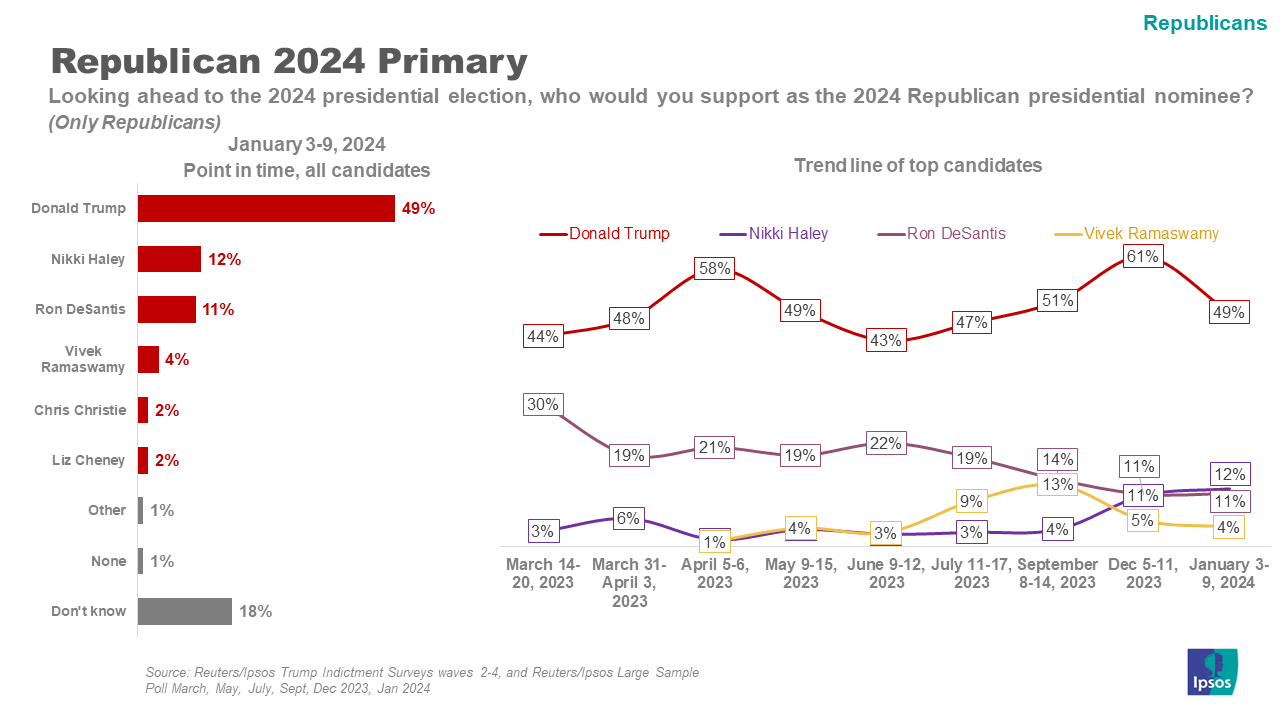
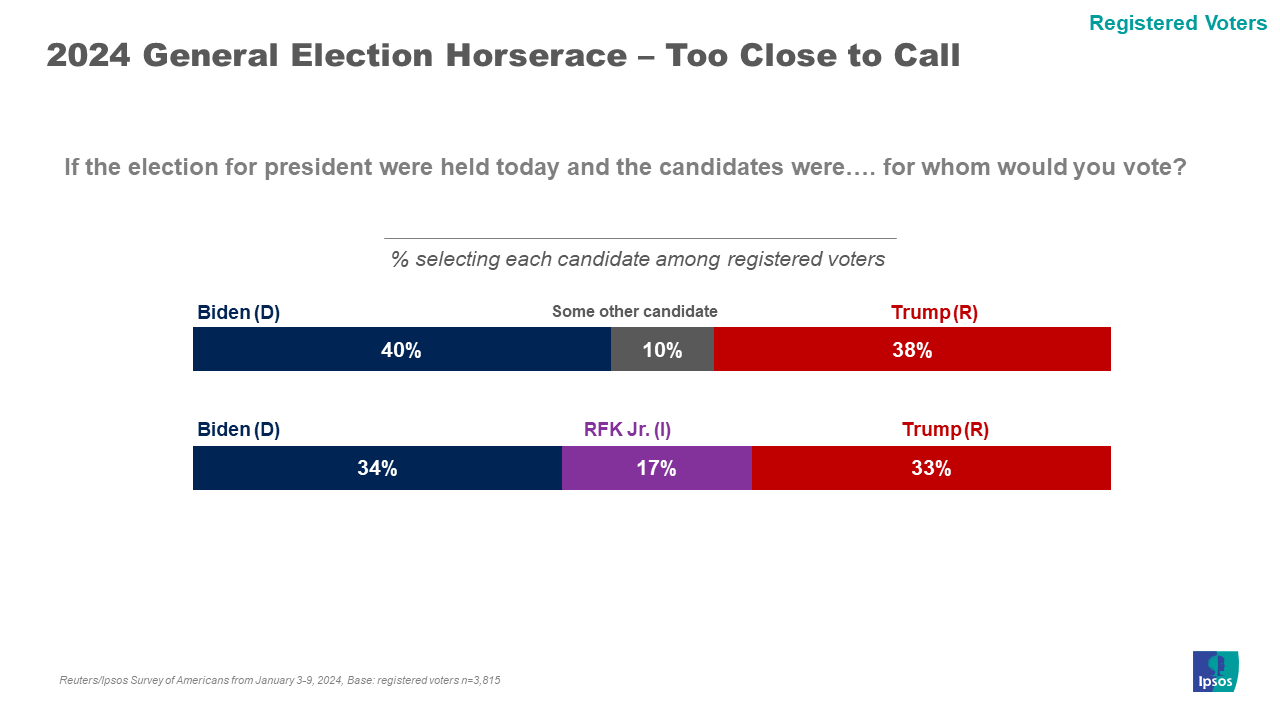
When it comes to issues that impact how Americans vote, the economy is seen as the most important issue (63%), followed by efforts to reduce crime (55%). On both issues, Donald Trump and Republicans are seen as better positioned on the issues than Joe Biden and the Democratic party.
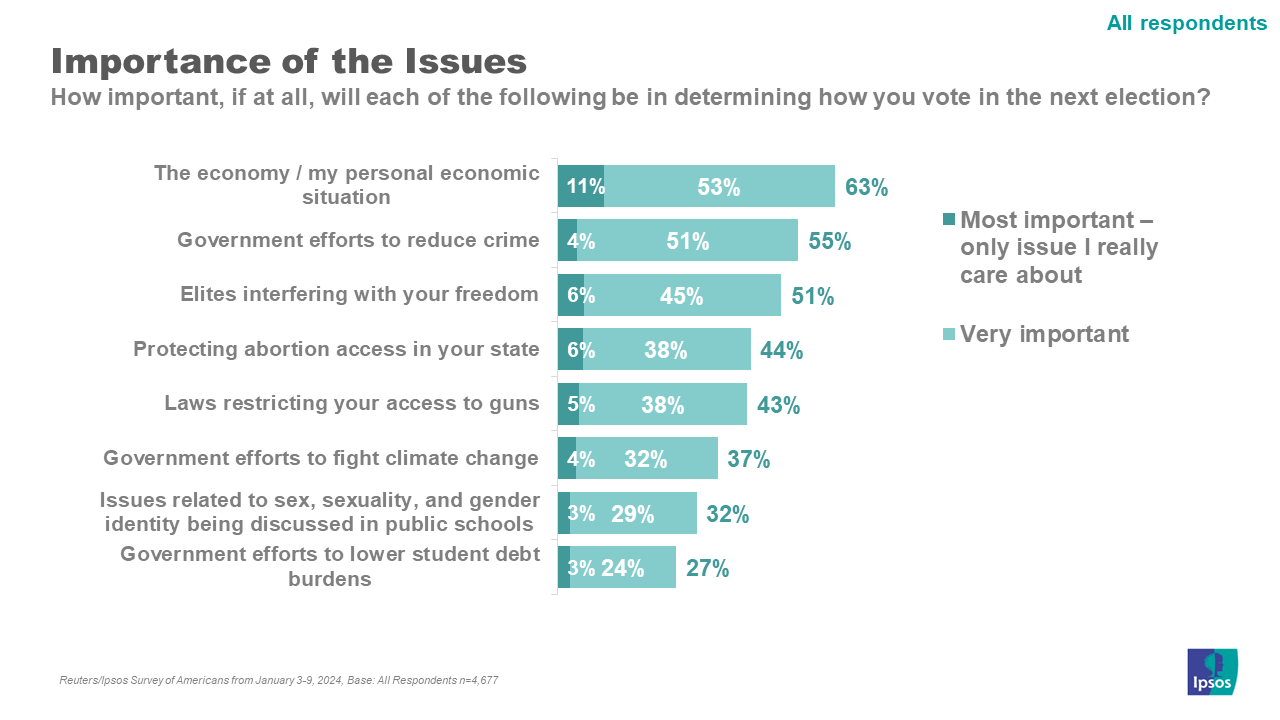
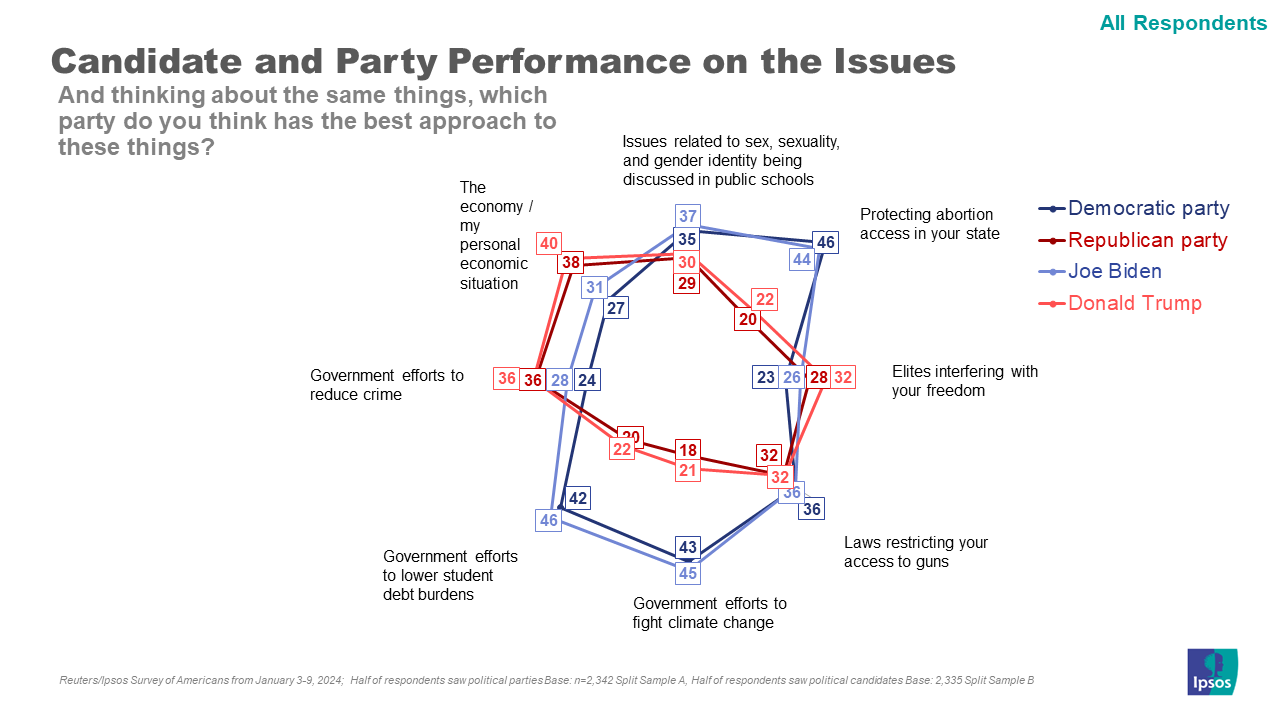
Looking at U.S. foreign policy, Americans have mixed feelings. More Americans support providing military aid to Ukraine (39%) than to Israel (28%) in their current conflicts with Russia and Hamas respectively. A significant number of Americans are unsure about whether the U.S. should provide weapons to Ukraine (28%) or to Israel (30%). Forty-five percent of Americans support the U.S. providing humanitarian aid to Palestinians, and 28% say they are unsure. In terms of resolving the conflict between Israel and Hamas, 40% of Americans see it as an urgent priority for lawmakers, while 30% disagree and 28% remain unsure.
A majority of Americans believe the allegations against both Donald Trump and Hunter Biden. Fifty-nine percent find it believable that Donald Trump called state officials to change the 2020 election outcome in an attempt to stay in office. Similarly, 56% say it is believable that Hunter Biden is receiving favorable treatment from U.S. prosecutors due to his father being the president. Moreover, nearly half of the population (47%) agrees that the mainstream media is biased and should be punished. Forty-two percent of Americans are in favor of arresting and detaining illegal immigrants until their deportation hearings. Lastly, concerning the current state of the nation, 34% of Americans believe that the country is in crisis and needs a strong president who should be allowed to govern with minimal interference from courts and Congress.
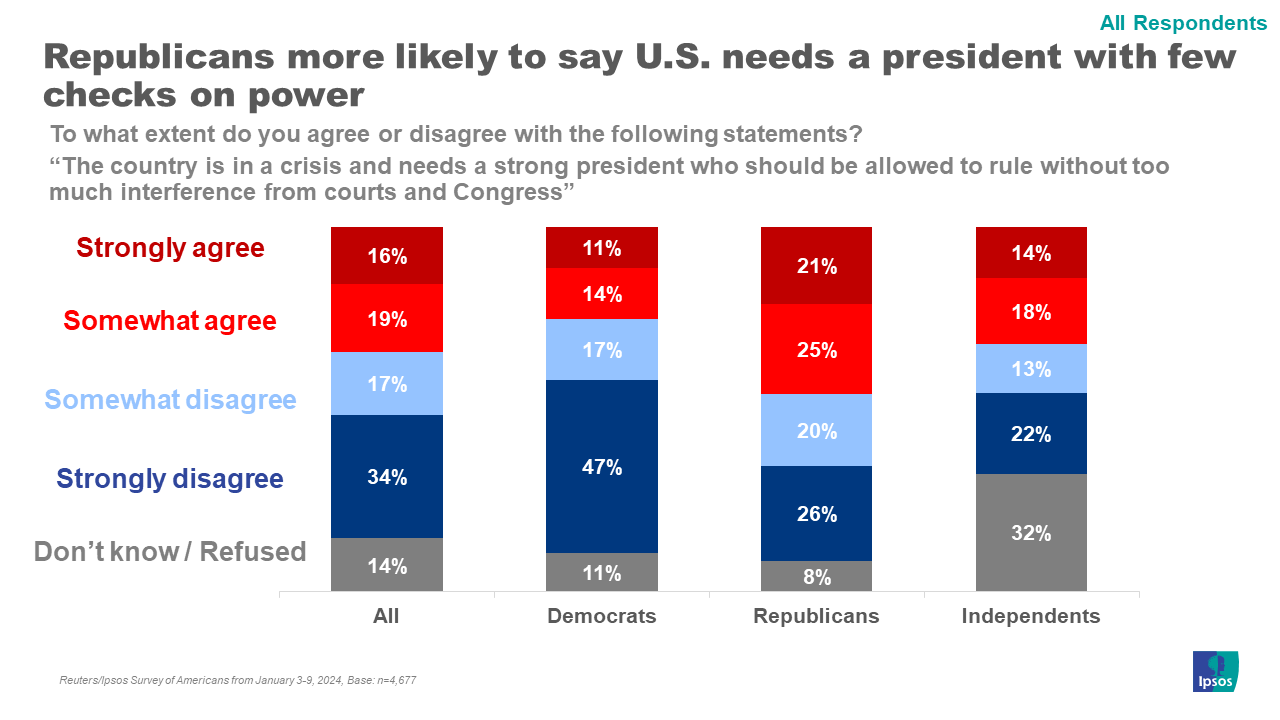
About the Study
This Ipsos poll was conducted January 3-9, 2024, by Ipsos for Reuters using the probability-based KnowledgePanel®. This poll is based on a representative probability sample of 4,677 general population adults age 18 or older in the United States. The sample includes 2,001 Democrats, 1,941 Republicans, and 449 independents.
The margin of sampling error for this study is plus or minus 1.54 percentage points at the 95% confidence level, for results based on the entire sample of adults. The margin of sampling error takes into account the design effect, which was 1.15. The margin of sampling error is higher and varies for results based on other sub-samples. In our reporting of the findings, percentage points are rounded off to the nearest whole number. As a result, percentages in a given table column may total slightly higher or lower than 100%. In questions that permit multiple responses, columns may total substantially more than 100%, depending on the number of different responses offered by each respondent. This poll also has a margin of plus or minus 2.71 percentage points for Democrats, plus or minus 2.73 percentage points for Republicans, and plus or minus 2.92 percentage points for independents.
The survey was conducted using KnowledgePanel, the largest and most well-established online probability-based panel that is representative of the adult US population. Our recruitment process employs a scientifically developed addressed-based sampling methodology using the latest Delivery Sequence File of the USPS – a database with full coverage of all delivery points in the US. Households invited to join the panel are randomly selected from all available households in the U.S. Persons in the sampled households are invited to join and participate in the panel. Those selected who do not already have internet access are provided a tablet and internet connection at no cost to the panel member. Those who join the panel and who are selected to participate in a survey are sent a unique password-protected log-in used to complete surveys online. As a result of our recruitment and sampling methodologies, samples from KnowledgePanel cover all households regardless of their phone or internet status and findings can be reported with a margin of sampling error and projected to the general population.
The data for the total sample were weighted to adjust for gender by age, race/ethnicity, Census region, education, household income, political party identification, and 2020 presidential vote. The demographic benchmarks came from the 2023 March Supplement of the Current Population Survey (CPS). Political party identification benchmarks came from high quality 2023 ABC telephone polls, and the official 2020 election results came from the Federal Election Commission.
For more information on this news release, please contact:
Chris Jackson
Senior Vice President, U.S.
Public Affairs
[email protected]
Annaleise Azevedo Lohr
Director, U.S.
Public Affairs
[email protected]
About Ipsos
Ipsos is one of the largest market research and polling companies globally, operating in 90 markets and employing over 18,000 people.
Our passionately curious research professionals, analysts and scientists have built unique multi-specialist capabilities that provide true understanding and powerful insights into the actions, opinions and motivations of citizens, consumers, patients, customers or employees. Our 75 solutions are based on primary data from our surveys, social media monitoring, and qualitative or observational techniques.
Our tagline "Game Changers" sums up our ambition to help our 5,000 customers move confidently through a rapidly changing world.
Founded in France in 1975, Ipsos has been listed on the Euronext Paris since July 1, 1999. The company is part of the SBF 120 and Mid-60 indices and is eligible for the Deferred Settlement Service (SRD).ISIN code FR0000073298, Reuters ISOS.PA, Bloomberg IPS:FP



